Influencing the de-colonisation of social work and social development through african indigenous knowledge systems
Introduction
African Indigenous knowledge can be defined as the knowledge that an indigenous community gains over generations of living in a particular environment. This includes all forms of knowledges, technologies, practises, values, and beliefs that enable the community to achieve stable livelihoods in their environment. African Indigenous knowledge systems (AIKS) help to shape and define societies’ existence and provides the foundation for African nation states beliefs and traditional practises. However, there remains limited emphasis on the body of knowledge around how to harness the knowledge systems. Indigenous knowledge systems are a key enabler of sustainable development for Global South countries and all indigenous peoples. Global South countries will not be able to realise their development goals without embracing indigenous knowledge systems. Indeed, local knowledge and approaches to social development have already yielded positive results in terms of tackling poverty and mitigating adverse impacts of climate change. These examples showcase what is possible when local contexts and thinking inform social development policy and practice.
Foregrounding local knowledge is also aligned with the decolonisation of knowledge and approaches to social development thinking and social work practice. Decolonisation is critical, relevant and provides a comprehensive understanding to the multiverse of the humanity of Africans in fully appreciating social development. The effort to reclaim as well as assert the sovereign power of Africans to self-determine in the aftermath of the invention of race, transatlantic slavery, and colonialism in its mutating forms, is imperative for social development (Ngwena, 2022).
The premise of decolonisation is one of critiquing existing power structures and dominant culture at multiple levels and IKS provide a basis for this interrogation.
We are excited to showcase how indigenous and local knowledge systems are disrupting dominant theories and practice in social development and social work, whilst working towards achieving the 17 Sustainable Development Goals.
Through a partnership of four Universities namely, Midlands State University, University of Applied Science and Arts Dortmund, theUniversity of Johannesburg, and the University of KwaZulu Natal; and in partnership with the International Consortium on Social Development (ICSD) Africa Branch, the symposium will bring together social work practitioners, social development practitioners, policy makers, PhD and Masters students to showcase and critically engage with how indigenous and local knowledge systems can inform and influence efforts to achieve the SDGs.
The Objectives of the symposium are:
- To share experiences on African indigenous knowledge systems and how they are being used to contribute to social development and social work practice and the Sustainable Development Goals.
- To showcase examples of social development and social work practice using local and indigenous knowledge systems towards achieving SDGs.
- To highlight how indigenous knowledge systems are being used to challenge and adapt existing, dominant social development and social work theories.
- To discuss the effectiveness of current social work programs in applying indigenous knowledge systems in advancing social work
Symposium outcomes
At the conclusion of the symposium, it is anticipated that the participants will have:
- Developed strong interdisciplinary academic and practice networks in the field of social development on the continent.
- Been exposed to innovative examples of how IKS is being used to challenge dominant approaches to development and fostering the achievement of SDGs.
- Gained an enhanced understanding of how to use indigenous knowledge systems to advance social development and social work practice.
Participants
Participants will include students, social work and social development scholars and practitioners from across the continent and globe.
Please note that although the DAAD partnership is a social work focused partnership, the joint symposium with ICSD provides the opportunity to strengthen and build new partnerships in the continent of Africa. In addition, through participation in the symposium, we hope to provide the opportunity to boost the commitment and confidence of social workers and social development practitioners and to make a stronger contribution to Afrocentric practices and policy development. Abstracts are therefore invited from a wide range of disciplines including agriculture, development studies, economics, education, health, psychology, sociology, and social work as key stakeholders in the social development sector.
Cross cutting themes are climate justice, gender equality, Environmental justice, Sustainability and Governance (ESG)
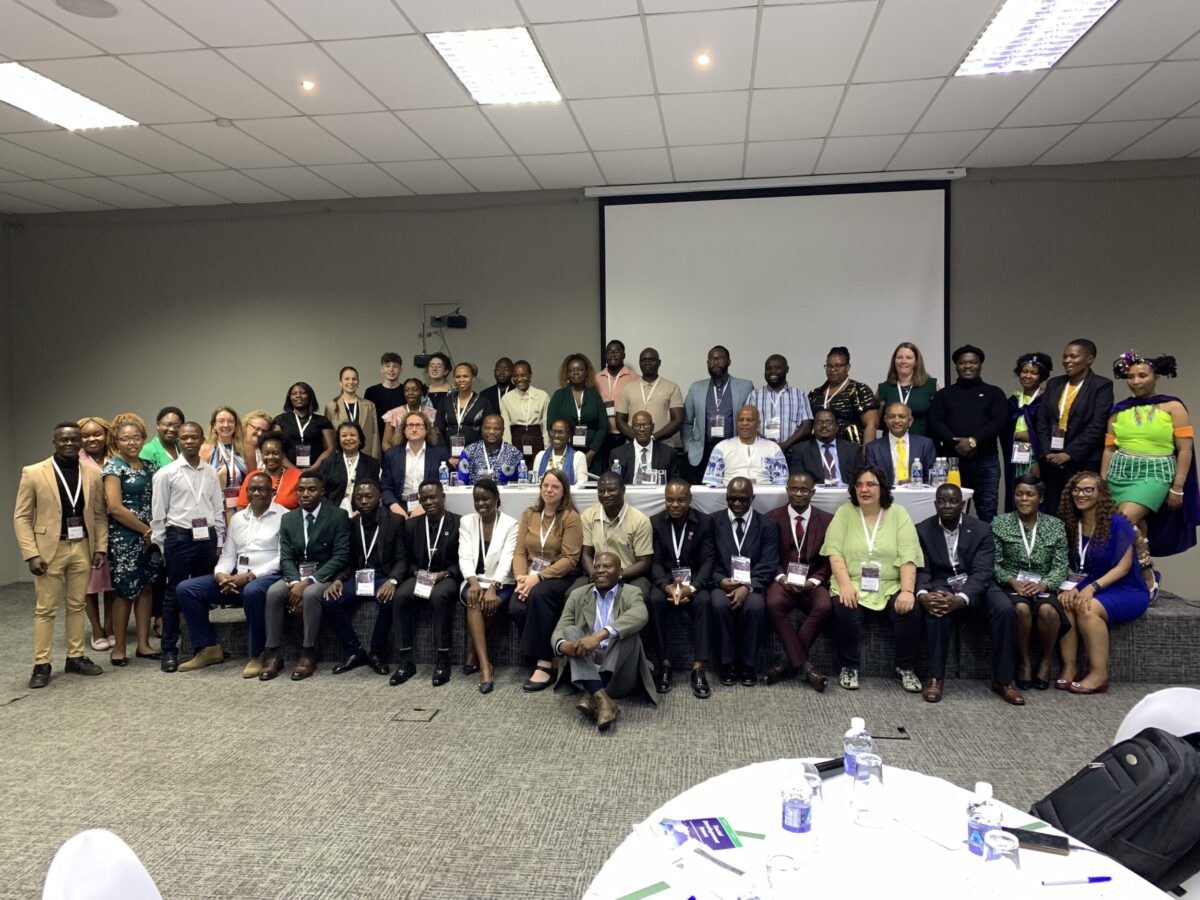
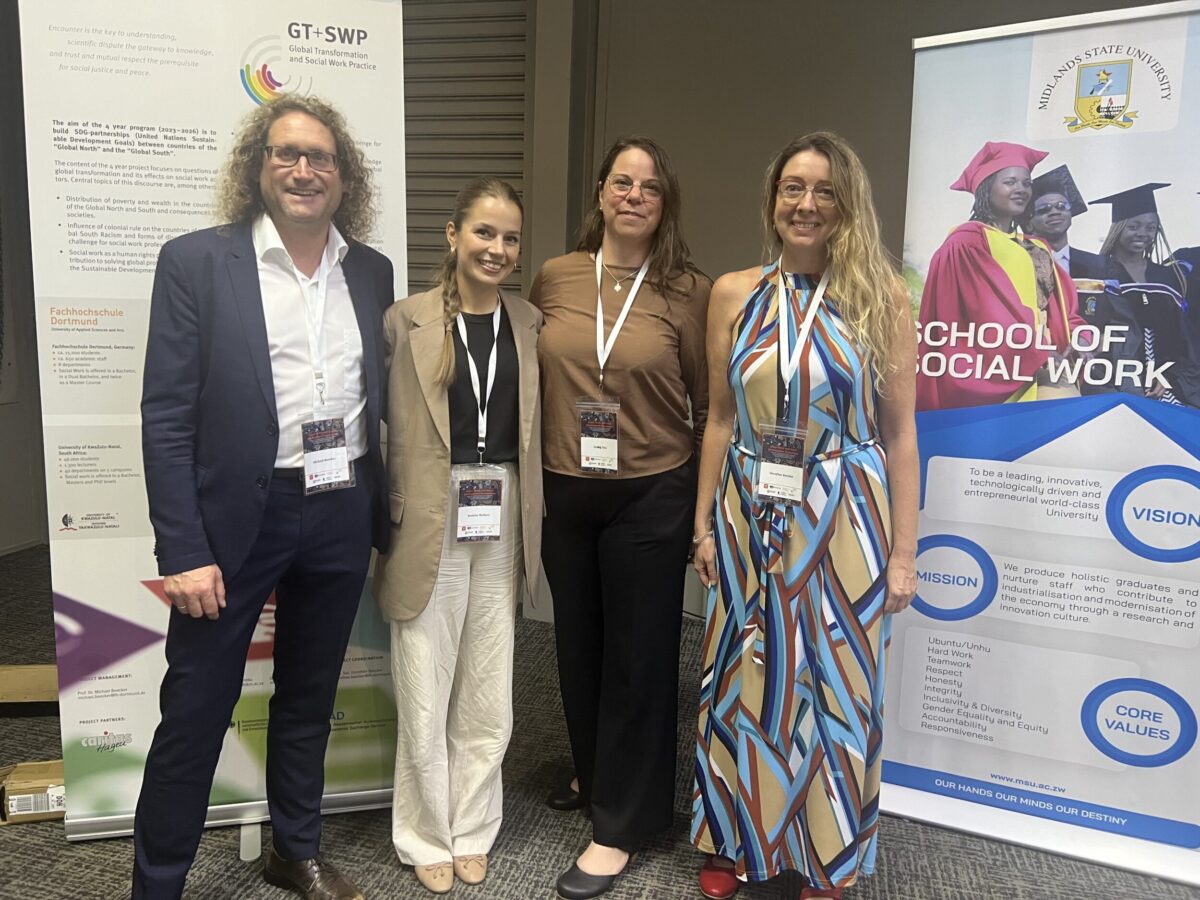
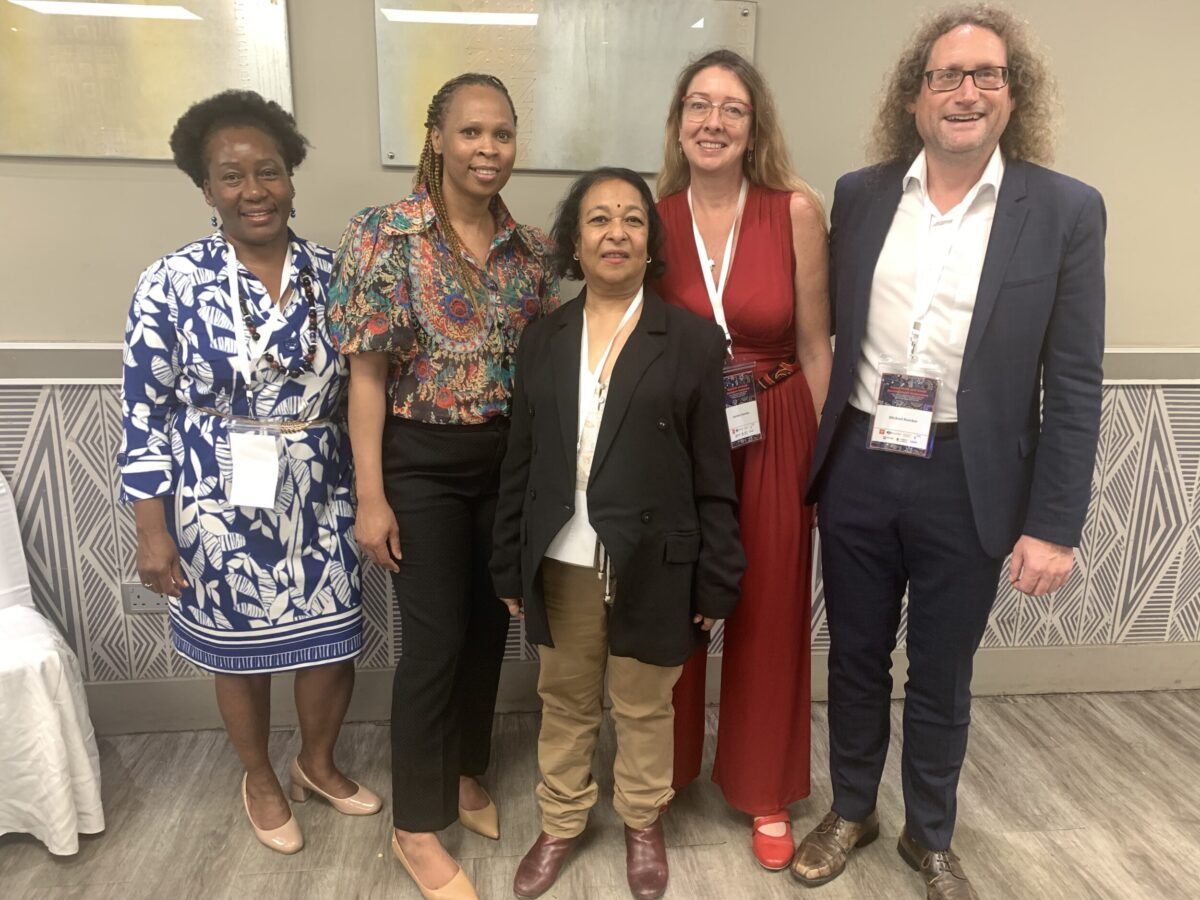
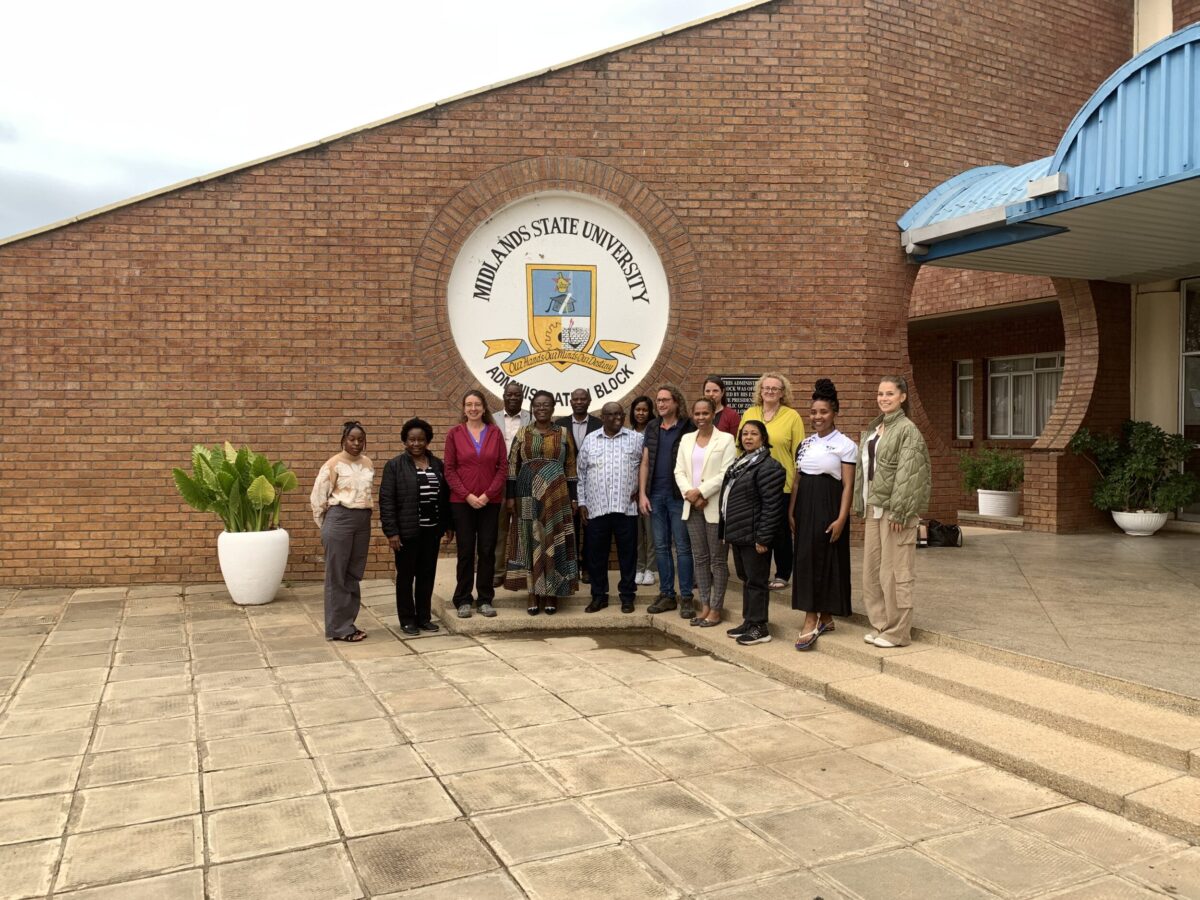
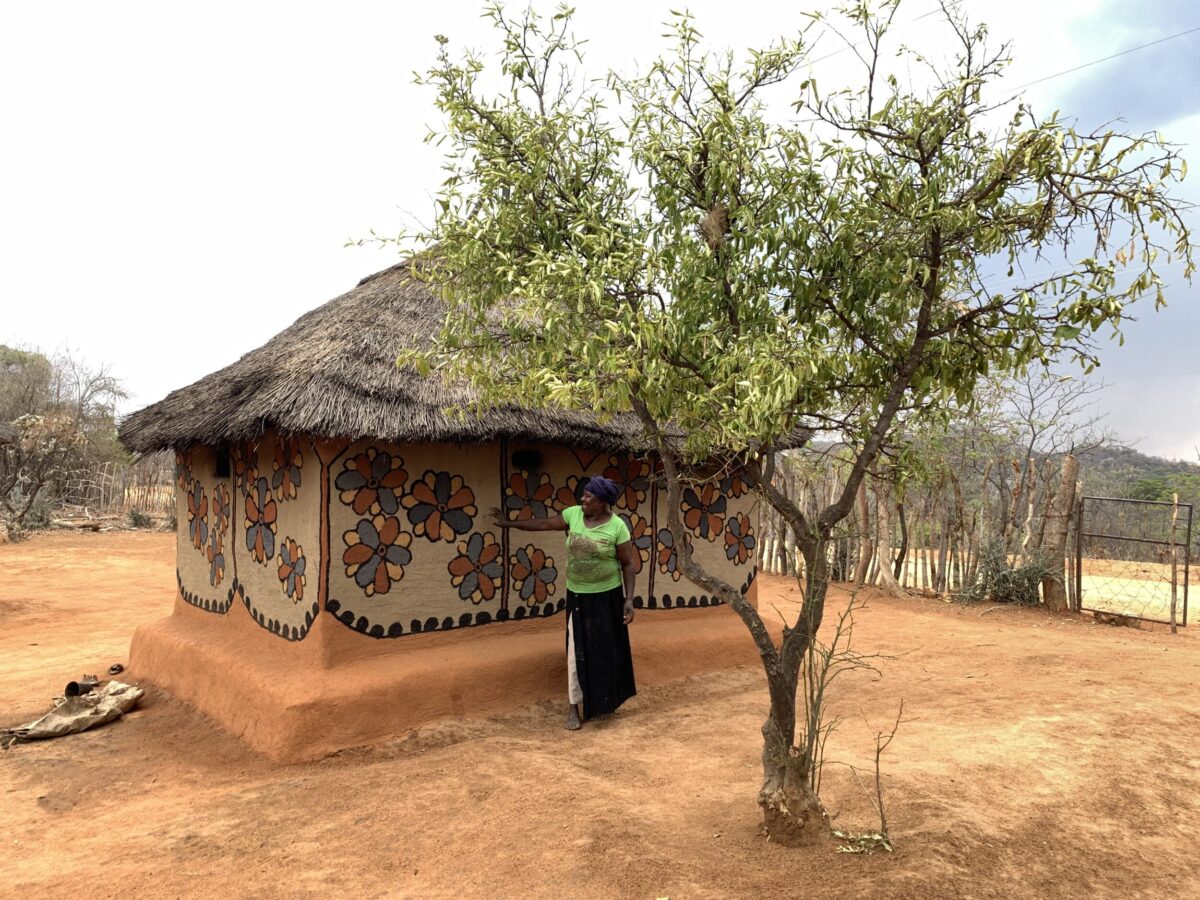
70 Wissenschaftler*innen diskutieren in Zimbabwe über die Nachhaltigkeitsziele der United Nations
Im Rahmen des vom DAAD geförderten Programms der fachbezogenen Partnerschaften organisierten vier Universitäten und Hochschulen – die Midlands State University , die Fachhochschule Dortmund, die University of Johannesburg und die University of KwaZulu Natal – in Zusammenarbeit mit dem International Consortium on Social Development (ICSD) Africa Branch ein internationales Symposium vom 14. bis zum 18. Oktober 2024. Kern des Programms ist es, Nachwuchswissenschaftler*innen zusammenzubringen und entlang der von der United Nations verabschiedeten Sustainable Development Goals (SDGs) globale Fragen zu diskutieren und Konsequenzen für die Soziale Arbeit zu ziehen. Das diesjährige Symposium setzte den Fokus auf indigene und lokale Wissenssysteme zur Erreichung der Nachhaltigkeitsziele. Dazu trafen sich insgesamt 70 Wissenschaftler*innen aus Ländern des „Globalen Nordens“ und des „Globalen Südens“.
Vertretend für die Fachhochschule Dortmund waren an der Midlands State University (MSU) am Hauptcampus in Gweru und der School of Social Work in Harare der Projektleiter Prof. Dr. Michael Boecker , die Projektkoordinatorin und Diplomsozialarbeiterin Dorothée Boecker , Romina Maillaro , Doktorandin am Fachbereich Angewandte Sozialwissenschaften , und Sina Levenig , Projektmitarbeiterin im Fachbereich. Romina Maillaro hat bei dem Symposium ihr Promotionsthema „Hat die Sozialarbeit ein Gerechtigkeitsproblem? Warum sind die Führungspositionen überwiegend von Männern besetzt,“ vor einem internationalen Fachpublikum vorgetragen.
Entkolonialisierung der Sozialen Arbeit durch afrikanische indigene Wissenssysteme
Bei dem Symposium ging es um die Einflussnahme auf die Entkolonialisierung der Sozialen Arbeit und sozialpolitischer Programme durch afrikanische indigene Wissenssysteme. Afrikanische indigene Wissenssysteme (AIKS) tragen dazu bei, die Existenz von Gesellschaften zu gestalten und zu definieren und bilden die Grundlage für den Glauben und die traditionellen Praktiken der afrikanischen Nationalstaaten. Das Wissen darüber, wie diese Wissenssysteme genutzt werden können, ist jedoch nach wie vor begrenzt. Indigene Wissenssysteme sind für die Länder des „Globalen Südens“ und alle indigenen Völker eine wichtige Voraussetzung für eine nachhaltige Entwicklung. Die Länder des „Globalen Südens“ werden nicht in der Lage sein, ihre Entwicklungsziele zu verwirklichen, ohne sich ihrer indigenen Wissenssysteme bewusst zu werden. Lokales Wissen und Ansätze zur sozialen Entwicklung haben bereits zu positiven Ergebnissen bei der Bekämpfung der Armut und der Abschwächung der negativen Auswirkungen des Klimawandels geführt. Diese Beispiele zeigen, was möglich ist, wenn lokale Kontexte und Denkweisen in die Politik und Praxis der sozialen Entwicklung einfließen. In dem Symposium konnte unter anderem gezeigt werden, wie indigene und lokale Wissenssysteme die vorherrschenden Theorien und Praktiken in Sozialpolitik und der Sozialen Arbeit durchbrechen und gleichzeitig auf die Erreichung der 17 Ziele für nachhaltige Entwicklung hinarbeiten können.
Wichtige Einblicke in die Strukturen der Sozialen Arbeit
Die Vorträge und Diskussionen boten intensive Einblicke in die Frage, wie tief koloniale Einflüsse in die Strukturen der Sozialen Arbeit eingreifen und wie sehr diese Einflüsse die heutige Praxis, das Denken und die Sprache prägen. Besonders eindrücklich war die Auseinandersetzung mit der Frage, wie Soziale Arbeit oft auf westlichen Werten basiert, die weltweit als universell gelten, jedoch kulturelle Diversität und unterschiedliche soziale Realitäten zu wenig berücksichtigen. Eine der zentralen Erkenntnisse aus den Diskussionen war es, dass eine „Dekolonisierung“ der Sozialen Arbeit nicht nur die Anpassung von Konzepten und Modellen voraussetzt, sondern dass es vielmehr einer grundsätzlichen Reflexion kultureller Kontexte und historischer Hintergründe bedarf. Dies betrifft vor allem die Frage, inwiefern „Hilfe“ und „Entwicklung“ auf einem westlichen Verständnis von Fortschritt basieren und wie dies paternalistische Strukturen verstärken kann.

Internationales Symposium an der Midlands State University in Harare”.
Internationale Soziale Arbeit in einer globalen Gesellschaft
Das DAAD-Team der kooperierenden Universitäten hat die Veröffentlichung ihrer Special Issue Ausgabe einer internationalen Fachzeitschrift, dem Journal of Social Development in Africa, vorgestellt. Mit einem eigenen Beitrag adressierten Prof. Dr. Michael Boecker und Dorothée Boecker die Bedeutung Internationaler Sozialer Arbeit als Menschenrechtsprofession in einer globalen Gesellschaft. „In einer zunehmend globalisierten Welt sind wir in vielfältiger Weise miteinander verbunden und in einer komplexen geopolitischen (Un-)Ordnung voneinander abhängig“. Dies gilt auch für diejenigen, die in der Sozialen Arbeit als Menschenrechtsprofession tätig sind. Lange Zeit herrschte die Vorstellung, dass Sozialarbeiter*innen ausschließlich auf nationaler Ebene agieren müssen und dass der Blick über das eigene Land hinaus zwar erfrischend sein kann, aber nicht zwingend notwendig ist. Heute wissen wir, wie wichtig internationale Beziehungen, Netzwerke und wissenschaftlicher Austausch sind. Geopolitische Entscheidungen betreffen die Soziale Arbeit und ihre Zielgruppen oft in ihrem Kern. Existenzielle Armut und Arbeitslosigkeit in Ländern des globalen Südens führen zu Flucht und Migration in die Länder des „Globalen Nordens“. Krisen wie Kriege oder Naturkatastrophen haben vielfältige Auswirkungen auf globale Wertschöpfungsketten. Die ungleiche Verteilung von Armut und Reichtum führt zu asymmetrischen Machtverhältnissen, die nicht zuletzt das Erbe von Kolonial- und Apartheideinflüssen sind. Umso wichtiger sind die Sustainable Development Goals (SDGs) der Vereinten Nationen.